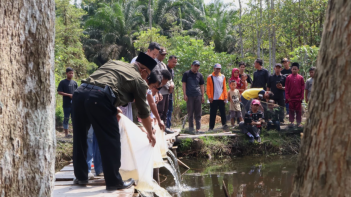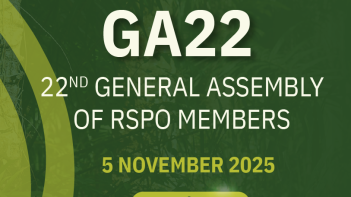The RSPO has partnered with the Institute for Policy Research and Advocacy (ELSAM) to build knowledge and capacities of Indonesian local communities and civil society organisations in dispute mediation and resolution. A series of training sessions aims to empower civil society to champion the rights of communities impacted by oil palm plantations.
Acting as the intermediary organisation, ELSAM has begun carrying out the IMPACT-EMPOWERMENT (Indonesian Movement for Plantation and Human Rights Transformation) training sessions in communities in Kalimantan, Sumatera and Papua, taking place from September 2023 to January 2024. This initiative seeks to produce an up-to-date mapping of oil palm plantation disputes in main producing regions within the country, in order to identify dispute patterns, their causes, and actors involved, leading to enhanced strategies for dispute resolution, particularly through internal company and RSPO complaint-handling mechanisms.
In October 2023, ELSAM also organised Certified Mediator Training for Communities and Civil Society Organisations in collaboration with the Indonesian Mediation Center. Its objective is to produce reliable local mediators who can mediate and negotiate with litigants, especially in human rights disputes in the palm oil sector context. These local mediators would eventually mediate disputes through available forums rooted in local or culture-based wisdom or forums facilitated by non-judicial mechanisms.
Eventually, these local mediators will have the opportunity to be one of the parties contributing to solving problems on the ground, if communities choose to use the mediation approach through the RSPO grievance mechanism. Participants from communities and over 20 civil society organisations in Indonesia participated in this initiative.
Impact of business operations on human rights
Disputes that arise in the palm oil industry often result from large-scale, land-based commodity management. Concerns related to the impacts of business operations on human rights and the environment are gaining global prominence, with civil society organisations collaborating more closely with impacted communities to address disputes through a range of channels, including both judicial and non-judicial platforms.
In 2021, the Palm Oil Conflict and Access to Justice in Indonesia (POCAJI) project analysed 150 conflicts that occurred between affected communities and palm oil sector corporations in Central Kalimantan, West Kalimantan, Riau and West Sumatra. It revealed that conflicts are generally triggered when local residents perceive companies’ land acquisition and distribution of benefits from land use as unfair.
POCAJI’s analysis highlighted three main avenues for addressing their grievances: adjudication in court, mediation and negotiation generally facilitated by local government officials, and the complaints system provided by the RSPO.
Moreover, human rights practitioners recognise that mediation can be a valuable instrument for the resolution of human rights disputes, offering several advantages such as lower costs, faster resolution, and the ability to maintain confidentiality. Through mediation, parties are given a platform to share their realities, challenges and expectations , allowing them to explore interest-based solutions that are usually not available in legal judicial mechanisms, leading to more sustainable relationships.
“In resolving conflicts, the effectiveness of mediation can be significantly enhanced when it is tailored to the local context and includes practices rooted in local traditions,” Nicholas Hurt, Head of Stakeholder Engagement, RSPO. “Given its extensive experience in strengthening civil society and promoting human rights through policy, advocacy and training, ELSAM can play a central role in empowering local communities in Indonesia to become more independent and proactive in defending their rights.”
This latest training initiative is part of RSPO’s ongoing global community outreach efforts in producer countries in partnership with local intermediary networks from related or affected communities. Apart from Indonesia, the outreach programme is currently being carried out in Guatemala, Honduras, Malaysia, and Nigeria.
Keep reading

Rowo Ombo: From Neglected Swamp to a Symbol of Hope and Conservation in Jambi, Indonesia

Save the Date: The 22nd General Assembly (GA22) of RSPO Members

Access into prisma

10 Years of RSPO in China: Driving Palm Oil Transformation Towards Sustainability

Updated Trace Function in prisma

Call for Expression of Interest: Independent Investigation of a Complaint

Latin American Smallholders, Key Global Brands Gather in Peruvian Amazon to Advance Sustainable Palm Oil

RSPO Forum for Members and Certification Bodies 2025: Strengthening Capacities and Building Bridges with RSPO Members




